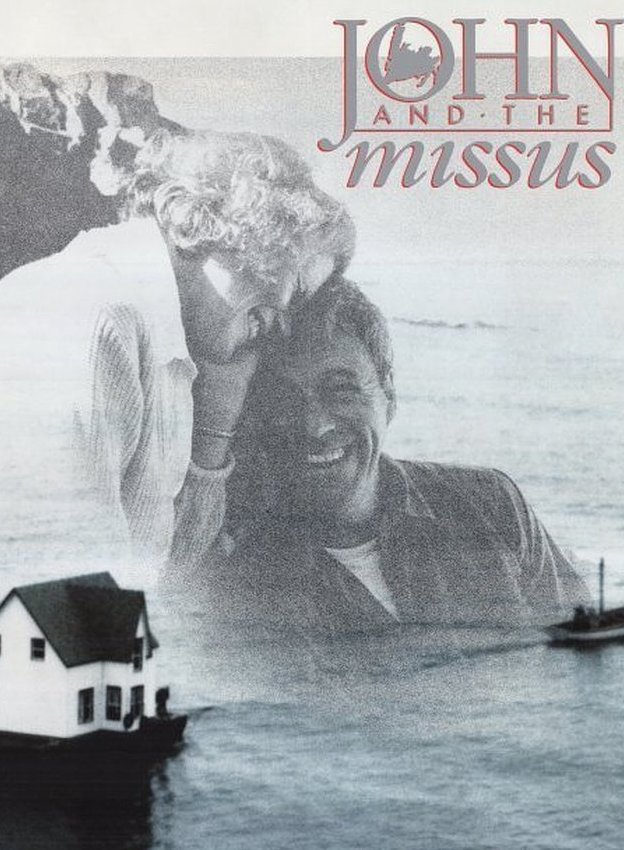Thursday, March 5, 1987.
JOHN AND THE MISSUS. Music by Michael Conway Baker. Written and directed by Gordon Pinsent, based on his 1974 novel. Running time: 98 minutes. Mature entertainment with the B.C. Classifier's warning: occasional swearing.
HE RANTS AND HE ROARS. A true Newfoundlander, John Munn (Gordon Pinsent) has the attention of his friends and co-workers, the men gathered in the Cup Cove Community Hall to hear the provincial government’s plans for their town.
Some time ago, he had a premonition. On the day that Denny Boland (Tim Webber) announced a new round of layoffs at the mine, John felt the presence of his late father (Doug Seymour).
Together with the shades of Cup Cove’s founders, he stood atop a bluff overlooking the sea.
Now, government representative Tom Noble (Neil Munro) has confirmed that the copper mine, recently closed by an accident, will never reopen. Their town has been written off and St. John’s wants to resettle the population further along the coast.
Munn, the respected mine foreman, has the floor and he speaks the heart, if not the mind, of the meeting. With a Shakespearean intensity, he voices his love for the place that his family has called home for more than six generations.
Behind him, to the right, his neighbours stand in silent agreement. As he punctuates a point with a gesture to the left, the camera’s eye follows his hand and there, arranged in a second, silent tableau, are the funereally-attired apparitions from his vision on the bluff.
Artists remember and they recreate. Among film artists, the urge to reach into personal pasts and expose the roots whence they came is powerful indeed.
The past, when viewed through the eyes of youth, is a golden time, one of laughter, emotional intensity and future promise. Two years ago [1985], Penticton’s Sandy Wilson looked back and recalled the story of My American Cousin. In 1984, Glace Bay’s Daniel Petrie remembered the tale of The Bay Boy.
Viewed from the middle years, the past can be more oppressive and dramatic. In bringing his 1974 novel John and the Missus to the screen, Grand Falls-born Gordon Pinsent pays tribute to a magnificent obsessive, a man deeply rooted in his land and the traditions it represents.
No apple-cheeked lad, John Munn sees little promise in the future being imposed upon him. “You’re telling me where to die,” he says to the implacable government agent.
His eloquence is for naught. It is September 1962, and change will come with or without his approval, a change that he can neither accept, nor effectively resist.
But for Pinsent’s eloquence, Munn might be just another colourful crazy. In both concept and performance, the writer-director-actor preserves the haunted man’s integrity and his dignity.
A cinematic chamber piece, Pinsent’s John and the Missus is in the personal filmmaking tradition of such Canadian classics as Bill Fruet’s 1972 feature Wedding in White and Claude Jutra’s Mon Oncle Antoine (1971). It is currently nominated for six Genie Awards, including Best Picture.
The above is a restored version of a Province review by Michael Walsh originally published in 1987. For additional information on this archived material, please visit my FAQ.
Afterword: Gordon Pinsent is part of an early generation of actors who, having made their mark in Canadian theatre and television, tried their luck in Hollywood. As mentioned in the introduction above, his U.S. feature film roles include that of the President, a Kennedyesque commander-in-chief who gives over control of his nation’s defence to a supercomputer in the the 1970 sci-fi classic Colossus: The Forbin Project.
While adding to his list of American movie and TV credits, the true Newfoundlander returned home to make The Rowdyman (1972). Pinsent wrote the screenplay and played the title role (earning his first Canadian Film Award for best actor) in a low-budget tale of a mill worker living life to the full. Filmed in Corner Brook, the movie became a a book in 1973, and Pinsent was well on his way to becoming a Canadian cultural icon.
John and the Missus missed the 1987 Best Picture award — that trophy went to Denys Arcand’s The Decline of the American Empire — but it was a Genie winner for Pinsent’s performance (best actor) and for B.C.-based composer Michael Conway Baker’s music score. Segue to July 1, 2017. As part of its sesquicentennial programming, the CBC scheduled a primetime broadcast of documentary director Brigitte Berman’s 2016 feature The River of My Dreams: A Portrait of Gordon Pinsent. Today (July 12, 2017) is his 87th birthday.
See also: Gordon Pinsent is the top-billed Ellen Burstyn’s co-star in 1981’s Silence of the North.
